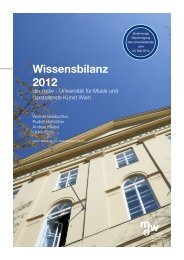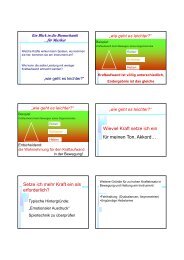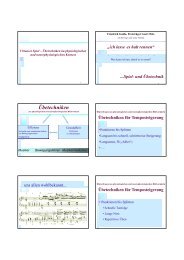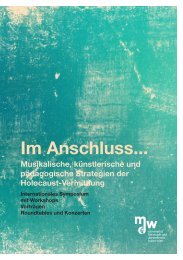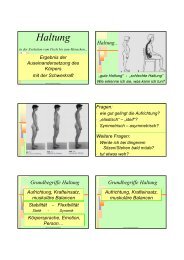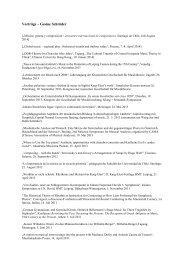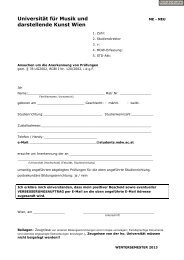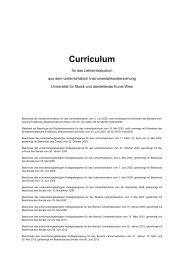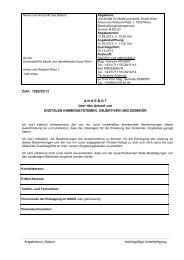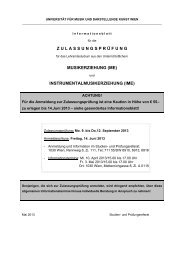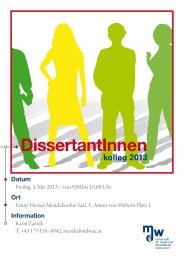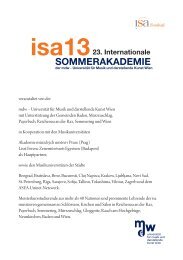Harp - Universität für Musik und darstellende Kunst Wien
Harp - Universität für Musik und darstellende Kunst Wien
Harp - Universität für Musik und darstellende Kunst Wien
Create successful ePaper yourself
Turn your PDF publications into a flip-book with our unique Google optimized e-Paper software.
Anton-von-Webern-Platz 1, 1030 Vienna, Tel.: +43-1-711 55 exts 6912/6914/6917/6919<br />
e-mail: studienabteilung@mdw.ac.at<br />
homepage: http://www.mdw.ac.at<br />
INFORMATION SHEET<br />
INSTRUMENTAL PROGRAMME<br />
major in<br />
HARP<br />
Application deadline for the entrance examination in June 2014<br />
for the 2014/15 academic year<br />
22 nd of May 2014<br />
online registration <strong>und</strong>er:<br />
http://www.mdw.ac.at → hotlinks → admission for entrance exam<br />
Institute for String Instruments<br />
Anton-von-Webern-Platz 1<br />
1030 Vienna / Austria<br />
Office: Ms. Nehyba<br />
Tel.: +43-1-711 55 DW 2301<br />
e-mail: nehyba@mdw.ac.at January 2014
QUALIFICATION PROFILE<br />
The degree programme in instrumental studies at the University of Music and Performing Arts Vienna<br />
prepares its students for a future career in the field of music referred to in the vernacular as “classical”,<br />
as opposed to popular forms of music. This area covers music from many centuries, styles and<br />
genres, all of which share one common characteristic: the performance of this type of music requires<br />
musicians to have the highest level of professional, technical and artistic training. The contemporary<br />
practice of classical music is characterised by traditional contexts in performance (opera, concerts,<br />
music in church), organisation (opera houses, concert halls, concert organisers, festivals, etc.),<br />
diffusion (music storage medium, radio, TV, etc.) and participative possibilities (orchestra, chamber<br />
music, soloist, etc.). In addition, new groupings and forms of musical communication are constantly<br />
evolving; the advancement of technical media has contributed significantly to this development.<br />
Considering these circumstances it would not be practical to attempt a detailed description of career<br />
possibilities (beyond the relatively traditional ones as orchestra, ensemble or solo musicians – not to<br />
mention the need for instructors at the highest level), and an attempt at quantification would serve<br />
absolutely no purpose in light of the number of imponderable prospects. A “career” (i.e. finding one’s<br />
own place in musical life) will always depend on personal qualifications and the development of each<br />
musician individually. It is important to point out that a career as an instrumentalist firstly requires<br />
talent, and secondly dedication, hard work and a serious time commitment beginning as early as<br />
childhood. While the University of Music and Performing Arts can contribute to improving the<br />
opportunities for early musical training (by training teachers and by offering preparatory courses), it is<br />
also dependent on these very stepping stones. This university degree programme offers the highest<br />
level of training enabling students to attain the apex of professional achievement, thereby<br />
guaranteeing the utmost in artistic excellence. The degree programme in instrumental studies at the<br />
University of Music and Performing Arts Vienna endeavours to instil in its graduates the knowledge<br />
and skills that form the fo<strong>und</strong>ation for both pursuing a successful career in music and even<br />
significantly reshaping the contemporary music scene. The university realises that an artistic course of<br />
study cannot focus on the additive acquisition of knowledge and qualifications, but represents rather a<br />
process of development that involves a host of artistic and human aspects. These go beyond<br />
perfecting technique (fine motor skills) to encompass the process of <strong>und</strong>erstanding and even using<br />
one’s emotions as a vehicle for experiencing and making music.<br />
The curriculum meets these criteria in the formal sense by offering a three-pronged degree<br />
programme with areas of concentration (corresponding to the individual instruments) from the third<br />
semester, a second diploma examination after the eighth semester and the third and final diploma<br />
examination, followed by the granting of the academic degree “Magister artium /Magistra atrium”, after<br />
the 12 th semester. Furthermore, the criteria are met in terms of content by offering a “core degree<br />
programme” that ties a solid fo<strong>und</strong>ation of training on the respective instrument together with the<br />
necessary backgro<strong>und</strong> knowledge in music theory and music history and with a wide array of practical<br />
skills. This is in turn supplemented by a range of related subjects on offer (areas of focus) that allow<br />
students to deepen their personal knowledge and acquire a fo<strong>und</strong>ation for specialising at a later date.<br />
A comprehensive spectrum in electives aids students in fine-tuning their abilities, as well as in<br />
supplementing and ro<strong>und</strong>ing out their studies.<br />
Our artistic approach is rooted in tradition, while remaining receptive to present and future<br />
developments. The university remains open to the myriad of existing and possible artistic fields, but is<br />
still committed to preserving the particular so<strong>und</strong> and style of music-making specific to Vienna.<br />
- 2 -
PROGRAMME OF STUDY<br />
Duration of study: 12 semesters.<br />
Total number of academic hours: 144.5 semester hours (359.75 ECTS credits).<br />
1 st stage of study: 27 semester hours (59.5 ECTS credits).<br />
2 nd stage of study: 61.5 semester hours (166.25 ECTS credits).<br />
3 rd stage of study: 31 semester hours (88 ECTS credits).<br />
Furthermore students have to complete an area of focus with 10 semester hours (15 ECTS credits)<br />
and electives corresponding to 15 semester hours (15 ECTS credits). For the artistic diploma thesis 16<br />
ECTS credits will be awarded.<br />
The diploma programme is divided into three stages of study; the first stage of study (2 semesters) is<br />
designed as introductory stage; the second stage covers 6 semesters, and the third stage 4<br />
semesters.<br />
Each stage of study is completed by passing the respective diploma examination.<br />
ENTRANCE EXAMINATION<br />
The purpose of the entrance examination is to assess the candidate’s artistic ability and his/her<br />
proficiency on his/her chosen instrument. Furthermore, the candidate must demonstrate knowledge of<br />
general music theory and proficiency in German necessary to be effective in classroom situations.<br />
The entrance examination consists of:<br />
a) A written examination covering general music theory and aural skills; if necessary it may be<br />
replaced or supplemented by an oral examination. The student must successfully complete this part of<br />
the examination to be permitted to take part b.<br />
b) Performance of several works from different periods on his/her chosen instrument:<br />
1) A compulsory piece:<br />
G. F. Händel Concert in B-Major (any version)<br />
2) An etude by Bochsa from "50 Etudes" op. 34<br />
3) A representative romantic or impressionistic piece<br />
GERMAN PROFICIENCY 1<br />
Students whose native language is not German must submit proof of German proficiency before the<br />
admission of the selected studies, that allows them to sufficiently follow lectures and <strong>und</strong>erstand<br />
coursework.<br />
Should the student fail to submit adequate proof of German proficiency by the end of the<br />
admission deadline, the student will not be able to be admitted to the degree programme.<br />
1<br />
For more information, see last page<br />
- 3 -
1 st STAGE OF STUDY<br />
Semester 1. 2.<br />
Courses<br />
h/w ECTS h/w ECTS<br />
HARP 1,2 IA 1 2.0 16 2.0 16<br />
Introduction to Music<br />
Comprehension 1,2<br />
IS 2.0 2 2.0 2<br />
Aural Training 1,2 EX 1.0 1 1.0 1<br />
Review of General Music<br />
Theory 1,2<br />
EX 1.0 0.5 1.0 0.5<br />
Music History 1, 2 LX 2.0 4 2.0 3.5<br />
Musical Acoustics 1 LE 2.0 2<br />
Organology LE 2.0 2<br />
Vocal Ensemble 1,2 EN 2.0 2 2.0 2<br />
Applied Music Physiology 1 LE 1.0 1<br />
Piano 1,2 IA 1.0 2 1.0 2<br />
TOTAL 13.0 29.5 14.0 30<br />
PREVIOUS EXPERIENCE REQUIREMENT<br />
Courses with previous experience requirement:<br />
Academic records required:<br />
HARP 2 HARP 1<br />
Piano 2 Piano 1<br />
1 st DIPLOMA EXAMINATION<br />
The first diploma examination gives the students the opportunity to demonstrate that they have<br />
mastered the material in the orientation phase and acquired the practical and theoretical knowledge<br />
and skills <strong>und</strong>erpinning the continuation of their studies.<br />
The first diploma examination consists of the examinations from the required courses in the first stage<br />
of studies. The candidate has passed the examination in his/her instrument if s/he has received a<br />
positive evaluation from the second semester.<br />
1 Abbreviations:<br />
Conversatorium<br />
Ensemble<br />
Exercise<br />
Individual artistic instruction<br />
Introductory seminar<br />
Lecture<br />
Lecture and conversatorium<br />
Lecture and exercise<br />
Practicum<br />
Seminar<br />
Hours per week<br />
CO<br />
EN<br />
EX<br />
IA<br />
IS<br />
LE<br />
LC<br />
LX<br />
PR<br />
SE<br />
h/w<br />
- 4 -
2 nd STAGE OF STUDIES<br />
Courses<br />
Semester 3 rd 4 th 5 th 6 th 7 th 8 th<br />
h/w ECTS h/w ECTS h/w ECTS h/w ECTS h/w ECTS h/w ECTS<br />
HARP 3-8 IA 2.0 16 2.0 16 2.0 16 2.0 16 2.0 16 2.0 16<br />
Aural Training 3-6 EX 1.0 1 1.0 1 1.0 1 1.0 1<br />
Composition Theory<br />
1-5<br />
LX 2.0 4 2.0 4 2.0 4 2.0 4 2.0 4<br />
Musical Forms 1,2 IS 2.0 4 2.0 4<br />
Music History 3,4 LX 2.0 3 2.0 3<br />
Piano 3-7 IA 1.0 2 1.0 2 1.0 2 1.0 2 1.0 2<br />
Literature Studies<br />
with Solo Repetiteur<br />
<strong>Harp</strong> 1-6<br />
Historical<br />
Performance<br />
Practices 1<br />
(Introduction)<br />
Historical<br />
Performance<br />
Practices 2<br />
Contemporary<br />
Music 1<br />
(Introduction)<br />
IA 0.5 0.25 0.5 0.25 0.5 0.25 0.5 0.25 0.5 0.25 0.5 0.25<br />
LX 2.0 3<br />
EN 2.0 2<br />
LX 2.0 3<br />
Orchestra 1-3 EX 2.5 1.25 2.5 1.25 2.5 1.25<br />
Orchestra<br />
Repertoire and<br />
Audition Training<br />
<strong>Harp</strong> 1-6<br />
Chamber Music for<br />
Various Ensembles<br />
1-3<br />
EX 0.5 0.5 0.5 0.5 0.5 0.5 0.5 0.5 0.5 0.5 0.5 0.5<br />
EN 1.0 2 1.0 2 1.0 2<br />
TOTAL 9.0 26.75 9.0 26.75 11.0 29.75 12.5 29 11.5 30 8.5 24<br />
PREVIOUS EXPERIENCE REQUIREMENT<br />
The student must fulfill the following previous experience requirement prior to enrolling for courses:<br />
Courses with previous experience requirement:<br />
HARP 3-8<br />
Academic records required:<br />
Completion of the preceding semester class in<br />
HARP<br />
- 5 -
2 nd DIPLOMA EXAMINATION<br />
The second diploma examination gives students the opportunity to demonstrate that they have<br />
acquired the skills on their chosen instrument, as well as the supplementary abilities and theoretical<br />
knowledge necessary to allow students to potentially achieve artistic maturity.<br />
The second diploma examination consists of a final examination before a jury (i.e. a performance<br />
before an examining board). The subject of the examination is the candidate’s instrument of choice.<br />
Students must have completed all courses from the second stage of studies in order to be admitted to<br />
the second jury diploma examination.<br />
For the second diploma examination, the candidate must select a programme representing works from<br />
the major eras and styles relevant to the respective instrument, in particular also works characteristic<br />
of the tonal language of the repertoire beginning with the second half of the 20 th century. The<br />
examination programme must also include musically and technically demanding music.<br />
(Orchestral instruments only:) Important excerpts from the orchestral repertoire (“orchestral<br />
passages”) also make up part of the diploma examination programme.<br />
Playing time may not come to less than 20 minutes. The candidate is free to choose the first piece to<br />
be performed. Interruptions (for lack of time) will be specified in advance.<br />
The student must be prepared to play the following programme:<br />
1) A concert at the level of difficulty of:<br />
W. A. Mozart Concert for Flute and <strong>Harp</strong><br />
2) A baroque or classical work in several movements e.g.:<br />
J. Parry - 4 Sonatas<br />
A. Rössler-Rosetti – 6 Sonatas<br />
D. Scarlatti – 2 Sonatas<br />
3) Two additional solo works, one with virtuos character at the level of difficulty of:<br />
M. Tournier: Féerie<br />
N. Rota - Sarabande e Toccata<br />
M. Flothuis - Pour le Tombeau d'Orphee<br />
4) A work for chamber music in arbitrary instrumentation performed with ensemble at the level of<br />
difficulty of:<br />
C. Saint Saens – Fantasia for Violin and <strong>Harp</strong> op. 124<br />
The programme must include a contemporary work.<br />
5) Orchestra passages:<br />
a) Two solo cadences<br />
e.g. Tschaikowsky – Ballette<br />
B. Britten – Young Person's Guide to the Orchestra<br />
B. Smetana – Vysehrad<br />
b) Two performance practise passages from opera literature<br />
c) Two performance practise passages from symphonic literature<br />
All solo works are to be performed by memory with the exception of difficult contemporary works.<br />
- 6 -
3 rd STAGE OF STUDIES<br />
Course<br />
Semester 9 th 10 th 11 th 12 th<br />
h/w ECTS h/w ECTS h/w ECTS h/w ECTS<br />
HARP 9-12 IA 2.0 16 2.0 16 2.0 16 2.0 16<br />
Form Analysis IS 2.0 4<br />
Music History, Selected Chapters SE 2.0 4<br />
Piano 8 IA 1.0 2<br />
Literature Studies with Solo Repetiteur<br />
<strong>Harp</strong> 7-10<br />
Historical Performance Practices 3 EN 1.0 1<br />
IA 0.5 0.25 0.5 0.25 0.5 0.25 0.5 0.25<br />
Contemporary Music 2,3 EN 1.0 1 2.0 2<br />
Orchestra 4-6 EX 2.0 1 2.0 1 2.0 1<br />
Orchestra Repertoire and Audition<br />
Training <strong>Harp</strong> 7-9<br />
Chamber Music for Various Ensembles<br />
4-6<br />
EX 1.0 1 1.0 1 1.0 1<br />
EN 1.0 1 1.0 1 1.0 1<br />
TOTAL 9.5 23.25 10.5 25.25 8.5 23.25 2.5 16.25<br />
PREVIOUS EXPERIENCE REQUIREMENT<br />
The student must fulfill the following previous experience requirement prior to enrolling for courses:<br />
Courses with previous experience<br />
requirement:<br />
HARP 9-12<br />
Academic records required:<br />
Completion of the preceding semester class in<br />
HARP<br />
- 7 -
AREAS OF FOCUS<br />
The following courses in related subjects (areas of focus) are offered, with each areas corresponding<br />
to 10 semester hours (= 15 ECTS credits), for students to deepen and expand their artistic and<br />
academic knowledge.<br />
Students are free to choose more than one area of focus.<br />
Areas of Focus<br />
Courses h/w x sem. total ECTS<br />
Orchestra<br />
Music History – Selected Chapters<br />
(on Orchestral Repertoire) 2.0, SE<br />
or<br />
2 1 2<br />
Form Analysis 2 (on Orchestral Repertoire) 2.0, SE<br />
Audition Training 1,2 1.0, EX 1 2 2<br />
Orchestral Repertoire (occasionally with rehearsal orchestra) 2 1 2<br />
2.0, EX<br />
Orchestra (Ensemble) 2.0, EX 2 2 4<br />
Total 10 15<br />
Chamber Music<br />
Music History – Selected Chapters<br />
2 1 2<br />
(on Chamber Music Repertoire) 2.0, SE<br />
Analysis 2 (on Chamber Music Repertoire) 2.0, SE 2 1 2<br />
Rehearsal Technique and Ensemble Leading 1,2 1.0, IS 1 2 2<br />
Chamber Music (Ensemble) 2.0, EN 2 2 4<br />
Total 10 15<br />
Early Music<br />
Instrument in Early Music 1-4 1.0, IA 1 4 4<br />
Historical Performance Practices 4,5 2.0, EN 2 2 4<br />
Vocal Ensemble, Early Music 2.0, EN 2 1 2<br />
Total 10 15<br />
Contemporary Music<br />
Instrumental Playing Practice and artistic Practise in 1 2 2<br />
Contemporary Music 1,2 1.0, IA<br />
Contemporary Chambermusic 1.0, 1 1 1<br />
Ensemble Contemporary Music (Production) 1 1.5, EN 1.5 1 1.5<br />
Ensemble Contemporary Music (Production) 2 2.0, EN 2 1 2<br />
Aesthetics in Contemporary Music 1,2 1.0, LX 1 2 2<br />
Workshop to diverse issues 1.5, EX 1.5 1 1.5<br />
Total 10 15<br />
Learning and Teaching<br />
Elementary Music Education 2.0, SE 2 1 2<br />
Didactic Analysis in Music 2.0, SE 2 1 2<br />
General Didactics in Instrumental Instruction 1,2 2.0, SE 2 2 4<br />
Educational Psychology 2.0, LE 2 1 2<br />
Total 10 15<br />
- 8 -
So<strong>und</strong> Research<br />
Musical Acoustics 2 (Physiological Acoustics and<br />
Psychoacoustics) 2.0, LE 2 1 2<br />
Acoustics and Playing Techniques for Stringed Instruments<br />
2.0, LE 2 1 2<br />
Basic Scientific Principles of Research in So<strong>und</strong> 2.0, SE 2 1 2<br />
Acoustics Practicum "Empirical Research Methods" 2.0, SE 2 1 2<br />
Acoustics Practicum "So<strong>und</strong> Analysis and Signal Processing"<br />
2.0, SE 2 1 2<br />
Total 10 15<br />
Popular Music<br />
Instrument in Popular Music 1-4 1.0, IA 1 4 4<br />
Jazz Harmony 1.0, LX 1 2 2<br />
Popular Music (Ensemble) 2.0, EN 2 2 4<br />
Total 10 15<br />
Integrative Movement<br />
Basic Principle of Music Physiology 2.0, LE 2 1 2<br />
Applied Music Physiology 2 1.0, LE 1 1 1<br />
Body Movement: 6 semesters (as available) 1 6 6<br />
Medicine for Musicians with Practical Exercises 1.0, PR 1 1 1<br />
Total 10 15<br />
Musicology<br />
Introductory Musicology Seminar 1-3 2.0, IS 2 3 6<br />
Musicology Seminar (as available) 2.0, SE 2 2 4<br />
Total 10 15<br />
Music Management<br />
Music Management 1-3 2.0, LE 2 3 6<br />
Culture and Media (Introduction) 2.0, LE 2 1 2<br />
Culture and Media (Exercise) 2.0, EX 2 1 2<br />
Total 10 15<br />
Analysis of Heinrich Schenker<br />
Introduction to Voice-leading Analysis 1,2 2.0, LE 2 2 4<br />
Analysis of Heinrich Schenker 1,2 2.0, LE 2 2 4<br />
Musicanalytic Seminar (Schenker) 1, 2.0, SE 2 1 2<br />
Total 10 15<br />
- 9 -
ELECTIVES<br />
Students are free to choose their electives from the courses offered by all accredited universities in<br />
Austria and abroad; students must meet their elective requirement by passing the respective<br />
examinations in those courses.<br />
Students are to complete a total of 15 semester hours of elective courses (corresponding to 15 ECTS<br />
credits) regardless of their instrumental degree programme.<br />
Students are particularly advised to take any of the subjects listed in the curriculum for their<br />
instrumental degree programme.<br />
Courses may be chosen from the overall curriculum for the respective instrumental degree<br />
programme, provided that they are not identical with the required courses for that particular<br />
curriculum. Students are strongly advised to select their electives from the courses offered in the<br />
various areas of focus.<br />
Courses covering alternating/varied subject matter (e.g. Music History – Selected Chapters; Chamber<br />
Music, Orchestra, Historical Musical Practices; Contemporary Music) may be taken more than once to<br />
be applied toward the required semester hours of electives.<br />
Courses covering sequential subject matter (e.g. Piano) can be taken beyond what is necessary to<br />
meet mandatory course requirements for application toward the required semester hours of electives.<br />
Electives and courses may – depending on availability – be selected in particular from related fields of<br />
study.<br />
The following subjects / courses are also offered:<br />
Music Theory<br />
Music History<br />
• Compositional Practices 6 (Introduction to Composition and Arranging) 2.0, VU<br />
• Introduction to the History of Culture 1,2 2.0, LE<br />
• Repertoire for Organists 1,2 2.0, LE<br />
Musical Technique<br />
• Breathing Exercises for Wind Instrumentalists 1,2 1.0, EX<br />
• Organ for Pianists 1-4 1.0, IA<br />
• Organ for Cembalists 1-4 1.0, IA<br />
• Reed-Making for Oboists 1-4 1.0, EX<br />
• Reed-Making for Bassoonists 1-4 1.0, EX<br />
• Artistic, Artistic-Scholarly or Scholarly Project (as available)<br />
(2-8 hours, SE)<br />
Music Management<br />
• Introduction to Music Management 2.0, LE<br />
Special Focus “Integrative Breathing, Voice and Movement Training”<br />
• Kinematics 1,2 (Posture and Movement for Instrumentalists<br />
and Singers) 1.0, EX<br />
• Concentration Techniques (Autogenous Training) 1,2 1.0, EX<br />
• Breathing-Voice-Movement for Instrumentalists and Singers 1,2 1.0, EX<br />
• Functional Relaxation Techniques: My Body as an Instrument - Relaxation, So<strong>und</strong><br />
and Voice 1,2 1.0, EX<br />
- 10 -
ARTISTIC DIPLOMA THESIS<br />
All students in artistic fields of study must submit an artistic diploma thesis. The students have the<br />
right to submit a diploma thesis in one of the academic examination subjects defined in the curriculum<br />
instead of an artistic diploma thesis. The artistic diploma thesis is a requirement for registration for the<br />
third diploma examination. For the artistic diploma thesis 16 ECTS credits will be awarded.<br />
3 rd DIPLOMA EXAMINATION<br />
The third diploma examination gives students the opportunity to demonstrate that they have achieved<br />
artistic maturity at the end of their studies.<br />
The third diploma examination consists of a final examination before an examining board<br />
(performance before a jury). The subject of the examination is the candidate’s respective instrument.<br />
The third diploma examination consists of the examinations from all of the required courses and<br />
electives from the third stage of studies, as well as the artistic diploma thesis. The artistic diploma<br />
thesis must be approved and signed by the instructor for the artistic part.<br />
The third and final diploma examination is broken down into two parts:<br />
Part 1: Performance before the examining board (jury). Students must have<br />
completed the first part of the examination in order to be admitted to the second<br />
part.<br />
Part 2: Open recital of a programme of music corresponding to at least 1/3 of a<br />
full concert.<br />
The repertoire presented at the third diploma examination is to include works of all genres, eras and<br />
styles relevant to the instrument, in particular also works characteristic of the tonal language of the<br />
repertoire beginning with the second half of the 20 th century. Both musically and technically<br />
demanding pieces must be adequately represented in the examination programme.<br />
In the first part of the examination the playing time must be approximately 20 minutes. The candidate<br />
is free to choose the first piece to be performed. Interruptions in the performance (for lack of time) will<br />
be specified in advance.<br />
It is advisable to prepare a programme at the level of difficulty of:<br />
1) A concert<br />
e.g. by Boieldieu, Gliere, Ginastera, Reinecke, Debussy – Danses<br />
2) A baroque or classical work in several movements e.g.:<br />
C. Ph. E. Bach – Sonata<br />
J. S. Bach – Suite for Lute<br />
3) Two additional great concert works<br />
e.g. P. Hindemith – Sonata<br />
B. Britten – Suite<br />
G. Fauré – Impromptu<br />
E. Parish-Alvars – all great concert pieces<br />
M. Grandjany – Rhapsodie<br />
H. Renié – Légènde<br />
4) A work for chamber music performed with ensemble at the level of difficulty of:<br />
M. Ravel – Introduction et Allegro<br />
C. Debussy – Trio<br />
The programme must include a contemporary work.<br />
5) Orchestral Passages:<br />
R. Wagner – Tannhäuser<br />
Another performance practice passage from R. Wagner<br />
A performance practice passage from pieces of R. Strauss (e.g. Salome, Heldenleben, Don<br />
Juan)<br />
Two perfomance practice passages of candidate’s own choice<br />
All solo works are to be performed by memory with the exception of difficult contemporary works.<br />
- 11 -
TEACHER OF THE MAJOR ARTISTIC SUBJECT<br />
Adelheid Blovsky-Miller<br />
TUITION FEES:<br />
For Austrian students and students who have the same status as Austrian students (citizens of EU<br />
and EEA Member States, as well as Switzerland) when they overrun the duration in the stage of<br />
study per 2 semester:<br />
€ 363.36 per semester<br />
For all other students, including those who are stateless and those whose citizenship is <strong>und</strong>etermined:<br />
€ 726.72 per semester<br />
The following fee is to be paid by all students once a semester:<br />
Mandatory membership in the Austrian National Union of Students (“ÖH-Beitrag”) amounting to<br />
€ 18 per semester.<br />
The Austrian National Union of Students fee is the same for both Austrians and non-Austrians.<br />
- 12 -
German Proficiency<br />
Students whose native language is not German must submit proof of German proficiency before<br />
admission to their course. This will enable them to follow the lectures and <strong>und</strong>erstand the coursework.<br />
Any student who fails to submit adequate proof of German proficiency by the deadline for<br />
admissions will not be admitted to their degree programme.<br />
If you require a visa, you should apply for it immediately after passing the entrance<br />
examination in your home country, even if you do not yet have proof of German proficiency.<br />
The following documents are accepted as proof of adequate proficiency.<br />
1. A B1 certificate from an ÖSD examination centre (‘ÖSD Zertifikat Deutsch B1 (ZB1)’) or a Goethe<br />
Institute examination centre (‘Goethe-Zertifikat B1’)<br />
The ÖSD Central Examinations Office (www.osd.at) and the Goethe Institute (www.goethe.de) both<br />
maintain lists of authorised international institutions and language schools that hold examinations for<br />
the B1 certificate. Sample papers can also be obtained from the above websites.<br />
Where possible, it is recommended that students obtain a German proficiency certificate in their home<br />
country before taking the entrance examination.<br />
2. A pass certificate for a German test taken in conjunction with the entrance examination (This<br />
counts as a supplementary examination and corresponds to level B1.)<br />
This examination is designed for students who have not had the opportunity to sit for the German<br />
proficiency certificate. It should be noted that a level equivalent to B1 will be required. The test does<br />
not form part of the entrance examination, and attendance is not compulsory.<br />
As preparation, we recommend that you look at sample papers for the B1 certificate (see links above).<br />
Information about the time and location of the German test will be sent out following registration for the<br />
entrance examinations.<br />
Students who cannot attend the German test, and are not able to sit for a German proficiency<br />
certificate, should apply for an examination taking place at the end of September.<br />
Students who have neither passed the German test nor submitted alternative documentary<br />
evidence of proficiency will not be admitted to a degree programme.<br />
3. A certificate from the one-year ‘German as a Foreign Language’ course (‘Lehrgang Deutsch’)<br />
from the <strong>Universität</strong> <strong>für</strong> <strong>Musik</strong> <strong>und</strong> <strong>darstellende</strong> <strong>Kunst</strong> <strong>Wien</strong><br />
Please note that only those students who have taken the placement test at the beginning of the<br />
semester, and paid the course fee, may attend the ‘Lehrgang Deutsch’ course.<br />
4. A secondary school leaving certificate (‘Reifezeugnis’) from an Austrian or other Germanlanguage<br />
school with instruction in German (ie, Matura or Abitur)<br />
The B1 level is a minimum requirement for registration and commencement of degree studies at the<br />
<strong>Universität</strong> <strong>für</strong> <strong>Musik</strong> <strong>und</strong> <strong>darstellende</strong> <strong>Kunst</strong> <strong>Wien</strong>. It is important for students to improve their German<br />
language proficiency beyond this during the first years of their course. The University offers courses in<br />
‘German as a Foreign Language’ (‘Lehrgang Deutsch’) to students. These cover everyday language<br />
and include exercises and texts in the field of music.<br />
For more information about German courses in Vienna, please see www.campus-austria.at.<br />
- 13 -



